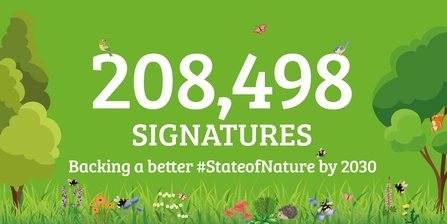The petition has been signed by over 208,000 people, and is backed by 70 organisations, and prominent wildlife campaigners including Chris Packham, Steve Backshall and Mya-Rose Craig (Birdgirl).
The campaign is backed by a cross-party group of politicians from across the Houses of Parliament. The hand-in was attended by Lord Randall (Conservative), Baroness Jones (Labour), Baroness Parminter (Liberal Democrat) and Professor Lord Krebs (cross-bench), who have all signed an amendment to the law in support of a target to halt nature’s decline by 2030.

